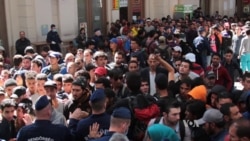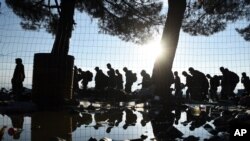The journey for the tens of thousands fleeing conflict in the Middle East is already difficult, but their challenges are compounded by an inability to communicate with locals in Europe.
Getting aid from a relief camp becomes a struggle. Elsewhere in Belgrade, a family sits by the roadside asking directions to a nearby hotel. Both instances are made worse due to a language barrier
Most migrants speak Arabic or Pashto, languages not common in Europe.
At a park in Belgrade, many cannot understand that an aid distribution center nearby is overflowing with supplies.
At a border crossing in Roske, they are struggling to figure out whether they will be able to go to Germany if they register here.
And at a train station in Budapest, they are spending hundreds of Euros to buy tickets to Germany when they do not need to do that.
Police in Budapest had a few translators, but they were overwhelmed. So the authorities appealed for volunteers.
People like Arabic speaker Al Mohammad Haya responded. “My work here [is] just to translate between the police and the people.”
They are few, however, compared to the thousands of migrants coming through. And they are only available at certain points.
Most of the time, migrants appear to be muddling through with hand gestures and guess work.






